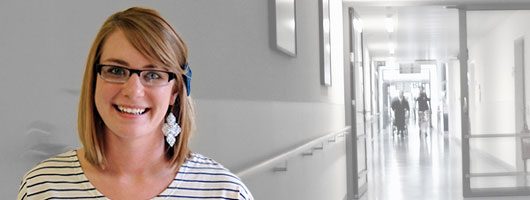 Pictured :: Codi Watts :: Nursing :: South Bend (hometown)
Pictured :: Codi Watts :: Nursing :: South Bend (hometown)
Bachelor of Science in Nursing
Degree Plan >>
Curriculum Design
Coursework in the Bachelor of Science in Nursing (B.S.N.) curriculum is divided into two separate areas: general education and nursing.
Degree Requirements (120 cr.)
All courses are 3 credit hours, unless otherwise designated.
General Education
For a more detailed description of the IU South Bend general-education curriculum, see a list of approved classes.
All courses certified as meeting the campuswide general-education requirements are designated in the Schedule of Classes.
General-education courses help lay the foundation for the nursing courses and also serve to provide the student with a well-rounded education. The general-education portion of the B.S.N. curriculum consists of approximately 60 credit hours, divided into area or course clusters. The campuswide general-education requirements are incorporated into the program of study. Although some courses may meet the requirements of more than one cluster, a single course can only be used to meet one requirement. All courses required for the degree must be taken for a grade. Certain courses require prerequisite or developmental courses, which are not listed here.
Campuswide Curriculum (33-39 cr.)
Fundamental Literacies (16-22 cr.)
- Writing :: ENG-W 131 Reading, Writing, and Inquiry I
- Critical Thinking :: Select one of the following:
- PHIL-P 102 Critical Thinking and Applied Ethics
- PHIL-P 140 Introduction to Ethics
- Oral Communication :: SPCH-S 121 Public Speaking
- Visual Literacy :: NURS-S 485 Professional Growth and Empowerment
- Quantitative Reasoning :: Select one of the following:
- MATH-K 300 Statistical Techniques for Health Professions
- NURS-H 355 Data Analysis/Practice and Research
- PSY-P 354 Statistical Analysis in Psychology
- SOC-S 351 Social Statistics
- Information Literacy :: COAS-Q 110 Introduction to Information Literacy (1 cr.)
- Computer Literacy :: CSCI-A 106 Introduction to Computing (or approved computer literacy course)
Common Core Courses (9 cr.)
Complete one course from each of the following three areas, as designated in the Schedule of Classes. One course must be at the 390- or 399-level.
- The Natural World :: Select N 190 The Natural World (astronomy, biology, chemistry, computer science, geology, mathematics, or physics)
- Human Behavior and Social Institutions :: Waived for B.S.N. majors
- Literary and Intellectual Traditions :: Select T 190 Literary and Intellectual Traditions (comparative literature, English, French, German, history, history and philosophy of science, philosophy, or Spanish)
- Art, Aesthetics, and Creativity :: Select A 190 Art, Aesthetics, and Creativity (comparative literature, English, fine arts, music, or theatre)
Contemporary Social Values (8 cr.)
Students must complete one course from each of the following three areas, as designated in the Schedule of Classes.
- Non-Western Cultures :: Select from approved course list
- Diversity in United States Society :: SOC-S 161 Principles of Sociology
- Health and Wellness (2 cr.) :: NURS-B 108 Personal Health and Wellness (2 cr.)
Additional Requirements
- Science (Critical/Analytical) Cluster (27 cr.)
- CHEM-C 102 Elementary Chemistry 2
- MICR-M 250 Microbial Cell Biology
- MICR-M 255 Microbiology Laboratory (2 cr.)
- PHSL-P 261 Human Anatomy and Physiology 1 (5 cr.)
- PHSL-P 262 Human Anatomy and Physiology 2 (5 cr.)
- PSY-P 103 General Psychology
- PSY-P 216 Life Span Developmental Psychology
Nursing Requirements
The degree program has 63 credit hours of required nursing courses. Students must be formally admitted to the nursing major to enroll in the following nursing courses. The nursing course sequence is identified by semester numbers and is generally completed in the order shown below. Nursing core courses begin with the fourth semester in the sophomore year. Students are required to successfully complete the entire set of courses which the School of Nursing designates each semester and must complete each level before progressing to the next level (sophomore, junior, senior).
Fourth or Sophomore Two (12 cr.)
- NURS-B 232 Introduction to Discipline
- NURS-B 244 Comprehensive Health Assessment
- NURS-B 245 Health Assessment: Practicum (1 cr.)
- NURS-B 248 Science and Technology of Nursing
- NURS-B 249 Science and Technology of Nursing: Practicum (1 cr.)
- NURS-B 251 Fundamentals of Nursing Clinical (1 cr.)
Fifth or Junior One (13 cr.)
- NURS-B 216 Pharmacology
- NURS-H 351 Alterations in Neuro-Psychological Health
- NURS-H 352 Alterations in Neuro-Psychological: Practicum (2 cr.)
- NURS-H 353 Alterations in Health I
- NURS-H 354 Alterations in Health I: Practicum (2 cr.)
Sixth or Junior Two (13 cr.)
- NURS-H 361 Alterations in Health II
- NURS-H 362 Alterations in Health II: Practicum (2 cr.)
- NURS-H 366 Nursing Care of Children and Their Families
- NURS-H 367 Nursing Care of Children and Their Families: Clinical (2 cr.)
- NURS-H 368 Nursing Care of Childbearing Families (2 cr.)
- NURS-H 369 Nursing Care of Childbearing Families: Clinical (1 cr.)
Seventh or Senior One (13 cr.)
- NURS-H 365 Nursing Research
- NURS-S 470 Restorative Health for Systems
- NURS-S 471 Restorative Health Related to Multi-System Failures: The Practicum (2 cr.)
- NURS-S 472 A Multi-System Approach to the Health of the Community by R.N.-B.S.N.
- NURS-S 473 Health of the Community: Practicum (2 cr.)
Eighth or Senior Two (12 cr.)
- NURS-S 481 Nursing Management
- NURS-S 482 Nursing Management: Practicum
- NURS-S 483 Clinical Nursing Practice Capstone
- NURS-S 485 Professional Growth and Empowerment (meets visual literacy requirement)